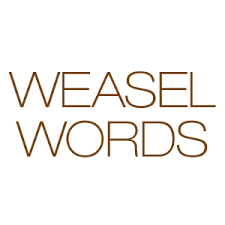


Weasel Words: The Lexicon of TV Pundits (But Not Exclusively)
From CommPro, written by Arthur Solomon, Public Relations Consultant:
Depending upon which dictionary you use, a weasel will be defined as “sneaky or untrustworthy,” (Meriram-Webster); “achieve something by use of cunning or deceit,” (Oxford Living Dictionaries); or “a word used “to temper the forthrightness of a statement; that makes one’s views equivocal, misleading or confusing,” (Dictionary.com).
Perhaps the most insidious use of weasel word language is by politicians who say one thing about their legislation stances during media interviews and then vote another way in committees or when legislation is brought to a vote.
Weasel words and phrases are a way of life in America, especially if you are in position of power. They are also part of the lexicon of individuals who make their living by commissions and by those in the communication business, like PR people and advertising agencies.
In our world, which includes the media, the weasel word language is most closely associated with the cable networks’ political shows, their pundits and some hosts.
Weasels have their own language, which I call “weasel speak,” used by cable pundits, who are introduced by anchors as analysts, but in reality base their opinions on the stories broken by investigative and beat reporters of major U.S. dailies and magazines.
In fact, virtually all the cable TV political shows mainly base their content on what has been reported by major print pubs, led by the New York Times, Wall Street Journal and Washington Post. And too often, weasel words are used to convey the impression that it was the cable reporters who broke the stories.
A few examples:
- “CNN is learning”. (From the N.Y. Times?)
- “MSNBC can now confirm the story.” (From The Washington Post?)
- ‘We have learned.” (From the Associated Press?)
- On March 13, MSNBC’s Chuck Todd led off his program with, “State Department officials told NBC News that”….re Rex Tillerson’s firing, giving the impression that it was new information even though it was rehashed since early that morning.
- And on April 10, Katy Tur, on MSNBC’s daily MTP program, led off with, “Sources are telling us,” regarding Trump’s response to the FBI investigation of the president’s lawyer, Michael Cohen, giving the impression that it was “breaking news,” even though the same information had been reported on other platforms for more than a day.
- Both MSNBC and CNN are guilty of weasel wording throughout the day by announcing “Breaking News,” when there is none.
- But, perhaps, the worst offender of weasel wording is Fox News Channel, which for decades used “Fair and Balanced” as its motto. (Since it dropped that mendacious motto, it now should be replaced with, “Untruthful and Untrustworthy.”)
For the rest of this piece, click here.